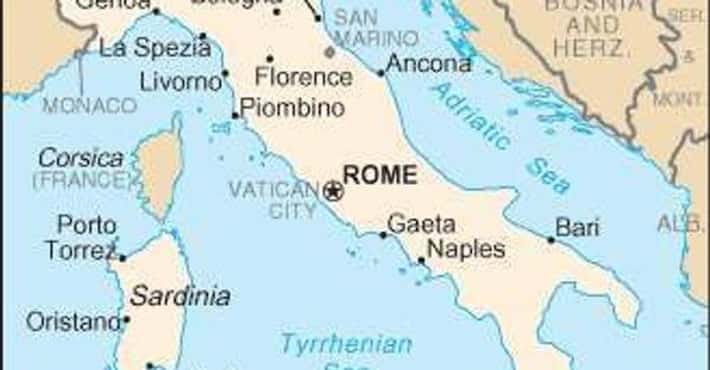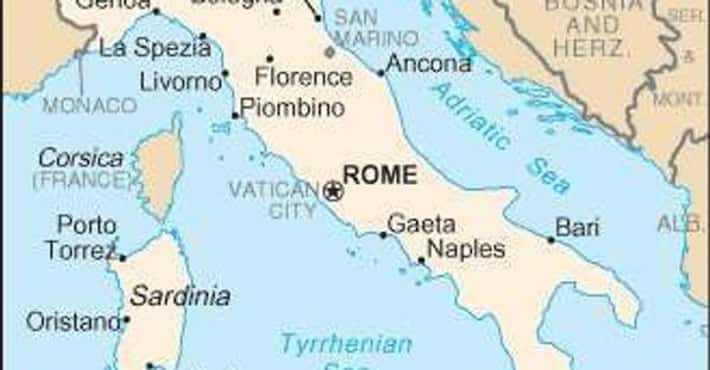- Dec. at 73 (1761-1835)Gian Domenico Romagnosi (Italian pronunciation: [romaɲˈɲoːzi]; 11 December 1761 – 8 June 1835) was an Italian philosopher, economist and jurist.
- Dec. at 66 (1932-1999)Gian-Carlo Rota (April 27, 1932 – April 18, 1999) was an Italian-American mathematician and philosopher.
- Age: 88Gianteresio Vattimo (born 4 January 1936) is an Italian philosopher and politician.
- Dec. at 52 (1548-1600)Giordano Bruno (, Italian: [dʒorˈdaːno ˈbruːno]; Latin: Iordanus Brunus Nolanus; born Filippo Bruno, (1548 – 17 February 1600) was an Italian Dominican friar, philosopher, mathematician, poet, cosmological theorist, and Hermetic occultist. He is known for his cosmological theories, which conceptually extended the then-novel Copernican model. He proposed that the stars were distant suns surrounded by their own planets, and he raised the possibility that these planets might foster life of their own, a philosophical position known as cosmic pluralism. He also insisted that the universe is infinite and could have no "center". Starting in 1593, Bruno was tried for heresy by the Roman Inquisition on charges of denial of several core Catholic doctrines, including eternal damnation, the Trinity, the divinity of Christ, the virginity of Mary, and transubstantiation. Bruno's pantheism was also a matter of grave concern, as was his teaching of the transmigration of the soul. The Inquisition found him guilty, and he was burned at the stake in Rome's Campo de' Fiori in 1600. After his death, he gained considerable fame, being particularly celebrated by 19th- and early 20th-century commentators who regarded him as a martyr for science, although historians agree that his heresy trial was not a response to his astronomical views but rather a response to his philosophy and religious views. Bruno's case is still considered a landmark in the history of free thought and the emerging sciences.In addition to cosmology, Bruno also wrote extensively on the art of memory, a loosely organized group of mnemonic techniques and principles. Historian Frances Yates argues that Bruno was deeply influenced by Arab astrology (particularly the philosophy of Averroes), Neoplatonism, Renaissance Hermeticism, and Genesis-like legends surrounding the Egyptian god Thoth. Other studies of Bruno have focused on his qualitative approach to mathematics and his application of the spatial concepts of geometry to language.More Giordano Bruno
- #138 of 752 onThe Greatest Minds of All Time
- #11 of 152 onFamous Supernatural Writers
- #13 of 68 onFamous Rosicrucians List
- Dec. at 72 (1466-1538)Giovanni Filoteo Achillini (Latin Joannes Philotheus Achillinus; 1466–1538) was an Italian philosopher. Born in Bologna, he was the younger brother of philosopher Alessandro. He applied himself to Greek, Latin, theology, philosophy, music, antiquities, jurisprudence, poetry, etc., but did not excel in any specific field. His poetry is the most noteworthy of his work; written in what has since been considered the bad taste that prevailed at the end of the 15th century, however, his works have left scarcely any memory of their existence but their titles. One of the principal was titled Viridario and contained the eulogy of many of his contemporaries in literature, with lessons of morality. He also wrote some remarks on Italian to the disparagement of Tuscan, and the praise of Bolognese, which he had used in his poems. Of antiquities, he had accumulated ample collections.
- Dec. at 68 (1875-1944)Giovanni Gentile (Italian: [dʒoˈvanni dʒenˈtiːle]; 30 May 1875 – 15 April 1944) was an Italian neo-Hegelian idealist philosopher, educator, and fascist politician. The self-styled "philosopher of Fascism", he was influential in providing an intellectual foundation for Italian Fascism, and ghostwrote part of The Doctrine of Fascism (1932) with Benito Mussolini. He was involved in the resurgence of Hegelian idealism in Italian philosophy and also devised his own system of thought, which he called "actual idealism" or "actualism", and which has been described as "the subjective extreme of the idealist tradition".
Giulio Pace
Dec. at 80 (1550-1631)Giulio Pace de Beriga (9 April 1550 – 1635) was a well-known Italian Aristotelian scholar and jurist.- Dec. at 66 (1805-1872)Giuseppe Mazzini (UK: , US: , Italian: [dʒuˈzɛppe matˈtsiːni]; 22 June 1805 – 10 March 1872) was an Italian politician, journalist, activist for the unification of Italy, and spearhead of the Italian revolutionary movement. His efforts helped bring about the independent and unified Italy in place of the several separate states, many dominated by foreign powers, that existed until the 19th century. He also helped define the modern European movement for popular democracy in a republican state.Mazzini's thoughts had a very considerable influence on the Italian and European republican movements, in the Constitution of Italy, about Europeanism, and, more nuanced, on many politicians of a later period: among them, men like U.S. President Woodrow Wilson and British Prime Minister David Lloyd George, but also post-colonial leaders such as Gandhi, Savarkar, Golda Meir, David Ben-Gurion, Kwame Nkrumah, Jawaharlal Nehru and Sun Yat-sen.
- Dec. at 73 (1858-1932)Giuseppe Peano (; Italian: [dʒuˈzɛppe peˈaːno]; 27 August 1858 – 20 April 1932) was an Italian mathematician and glottologist. The author of over 200 books and papers, he was a founder of mathematical logic and set theory, to which he contributed much notation. The standard axiomatization of the natural numbers is named the Peano axioms in his honor. As part of this effort, he made key contributions to the modern rigorous and systematic treatment of the method of mathematical induction. He spent most of his career teaching mathematics at the University of Turin. He also wrote an international auxiliary language, Latino sine flexione ("Latin without inflections"), which is a simplified version of Classical Latin. Most of his books and papers are in Latin sine flexione, others are in Italian.
Giuseppe Zevola
Age: 72Giuseppe Zevola (born 1952, in Napoli) is a painter, philosopher and poet. He has taught courses on painting at the Academy of Art of Rome and Catania and Perception and Visual Communication at Suor Orsola Benincasa of Naples, the Italian Institute for Philosophical Studies. Both his life and his art have been greatly influenced by his intellectual exchanges with Hermann Nitsch, Peter Kubelka, Antonio Gargano, Buz Barclay, Jonas Mekas and Bernard Heidsieck. Likewise, his decade of work in the Historical Archives of the Institute of the Banco of Naples Foundation yielded numerous works, the most important of which is his volume prefaced by Ernst H. Gombrich, The Pleasures of Boredom: Four Centuries of Doodles in the Historical Archives of the Bank of Naples.In 1998 the antique yacht Halloween became his home, laboratory and oratorio, inspiring his poem Prisoner of Freedom, which was translated into Japanese by Moto Hashiramoto. The book was presented at the Twelfth Congress of the Society for the Philosophy of Language (Piano di Sorrento, October 2005) as the first symmetrical book in the tradition of the illustrated poem. In 2003 Zevola created an installation in the Certosa of Padula entitled The Rule and the Exception: The All Too Human Cry of Giordano Bruno Responds to the Contemplative Silence of San Bruno, which is still on view. In 2004 he founded the publishing house Position Plotting Book which publishes in editions of 500 without a copyright the works of various international authors with translations in numerous languages. Recitations of these works have been the occasion for several performances around the world (Kyoto, Tokyo, Vilnius, Vienna, Berlin, Budapest, Paris, Naples, Rome and New York City). In 2005 Zevola was the chief assistant to Hermann Nitsch in his 122nd Aktion al Burgtheater of Vienna, thus celebrating their more than thirty-year intellectual and artistic friendship. The Sacred Forest of Bomarzo, an ancient place of inspiration, has now taken the place of Zevola’s yacht Halloween. There, he has launched new projects such as Art Real Estate: Center for the Free Circulation of People and Ideas Across the Planet. Among his most recent installations and exhibitions are Naples Calls New York: Mystic Teresa (Anthology Film Archives, November 2005, New York), Naples Calls Kyoto: 33 Photocollages for a Book (University of Art and Design, Kyoto, October 2005), Works and Days: The Rule (Certosa di San Lorenzo, Padula, June 2003), and currently Prince Antonio de Curtis Calls Daedalus: First Experiment of the Cosmographic Imagination (Kaplan’s Project, Palazzo Spinelli, Naples).Gloria Origgi
Age: 57Gloria Origgi (born 1967) is an Italian philosopher at the CNRS in Paris (Institut Jean Nicod) who works on the theory of mind, epistemology and social sciences applied to new technology. She is the founder (in 2002) and director of the innovative [1] project, a portal where many international virtual conferences in the social and cognitive sciences are being organized. She is the author of the book 'Reputation', published by Princeton University Press in 2017. Gloria Origgi has previously published a book on the American philosopher Willard Van Orman Quine, Introduzione a Quine, Laterza, 2000. She has edited the collection of essays Text-e. Text in the age of the Internet, Palgrave, 2006, based on a web conference that she co-organized with Noga Arikha and the research team of the library of the Centre Georges Pompidou in Paris (contributors include Umberto Eco, Jason Epstein, Dan Sperber and Theodore Zeldin). She has published numerous articles on social epistemology and cultural issues in English, French and Italian. Among her books: Qu'est-ce que la confiance? VRIN, 2008; La réputation, PUF 2015 (translated into Italian and into English) Her first work in Italian, La Figlia della Gallina Nera was published in Italy by Nottetempo (2008). She also writes for various newspapers and cultural magazines such as Il Fatto Quotidiano, MicroMega, Il Sole 24 Ore.Jacob Acontius
Dec. at 73 (1492-1566)Jacopo Aconcio (c. 1520 – c. 1566) was an Italian jurist, theologian, philosopher and engineer. He is now known for his contribution to the history of religious toleration.Julius Caesar Scaliger
Dec. at 74 (1484-1558)Julius Caesar Scaliger (; April 23, 1484 – October 21, 1558), or Giulio Cesare della Scala, was an Italian scholar and physician, who spent a major part of his career in France. He employed the techniques and discoveries of Renaissance humanism to defend Aristotelianism against the New Learning. In spite of his arrogant and contentious disposition, his contemporary reputation was high. Jacques Auguste de Thou claimed that none of the ancients could be placed above him and that he had no equal in his own time.- Dec. at 76 (1898-1974)Baron Giulio Cesare Andrea Evola (; Italian: [ˈɛːvola]; 19 May 1898 – 11 June 1974), better known as Julius Evola, was an Italian philosopher, painter, mystic, occultist, and esotericist. He has been described as a "fascist intellectual", a "radical traditionalist", "antiegalitarian, antiliberal, antidemocratic, and antipopular", and as having been "the leading philosopher of Europe's neofascist movement".Evola is popular in fringe circles, largely because of his extreme metaphysical, magical, and supernatural beliefs (including belief in ghosts, telepathy, and alchemy), and his extreme traditionalism. He himself termed his philosophy "magical idealism". Many of Evola's theories and writings were centered on his hostility toward Christianity and his idiosyncratic mysticism, occultism, and esoteric religious studies, and this aspect of his work has influenced occultists and esotericists. According to the scholar Franco Ferraresi, "Evola's thought can be considered one of the most radical and consistent anti-egalitarian, anti-liberal, anti-democratic, and anti-popular systems in the 20th century". It is a singular (though not necessarily original) blend of several schools and traditions, including German idealism, Eastern doctrines, traditionalism, and the all-embracing Weltanschauung of the interwar conservative revolutionary movement with which Evola had a deep personal involvement. Historian Aaron Gillette described Evola as "one of the most influential fascist racists in Italian history". He admired SS head Heinrich Himmler, whom he once met. Evola spent World War II working for the Sicherheitsdienst. During his trial in 1951, Evola denied being a fascist and instead referred to himself as a "superfascist". Concerning this statement, historian Elisabetta Cassina Wolff wrote that "It is unclear whether this meant that Evola was placing himself above or beyond Fascism".Evola was the "chief ideologue" of Italy's radical right after World War II. He continues to influence contemporary traditionalist and neo-fascist movements.
- Dec. at 79 (1901-1981)Lanza del Vasto (born Giuseppe Giovanni Luigi Maria Enrico Lanza di Trabia-Branciforte; 29 September 1901 – 6 January 1981) was an Italian philosopher, poet, artist, Catholic and nonviolent activist. He was born in San Vito dei Normanni, Italy and died in Murcia, Spain. A western disciple of Mohandas K. Gandhi, he worked for inter-religious dialogue, spiritual renewal, ecological activism and nonviolence.
- Dec. at 68 (1404-1472)Leon Battista Alberti was an Italian humanist author, artist, architect, poet, priest, linguist, philosopher and cryptographer; he epitomised the Renaissance Man. Although he is often characterized as an "architect" exclusively, as James Beck has observed, "to single out one of Leon Battista's 'fields' over others as somehow functionally independent and self-sufficient is of no help at all to any effort to characterize Alberti's extensive explorations in the fine arts." Alberti's life was described in Giorgio Vasari's Lives of the Most Excellent Painters, Sculptors, and Architects.
Lorenzo Magnani
Age: 72Lorenzo Magnani (born 1952), is an Italian philosopher who teaches philosophy of science in the Department of Humanities, Philosophy Section, at the University of Pavia, where he is full professor and directs the Computational Philosophy Laboratory. Recently he has been (2006/2012) visiting professor at the Sun Yat-sen University in China. In the event of the 50th anniversary of the re-building of the Philosophy Department of Sun Yat-sen University in 2010, an award was given to him to acknowledge his contributions to the areas of philosophy, philosophy of science, logic, and cognitive science.Magnani's primary research interests are the philosophy of science, logic, cognitive science, artificial intelligence, and philosophy of medicine. His historical research has centered on 19th- and 20th-century geometry and the philosophy of geometry.Currently he is studying the processes of conceptual innovation and change in science also in the perspective of abductive reasoning. A major objective of his research is to create a working synthesis between epistemological and historical perspectives and investigations of representations and reasoning in cognitive science. Recently he addressed the problem of the relationships between morality and technology and the problem of violence in a philosophical and cognitive perspective.His previous positions include visiting researcher (Carnegie Mellon University, 1992; McGill University, 1992–93; University of Waterloo, 1993; and the Georgia Institute of Technology, 1995 and 1998–99) and visiting professor (visiting professor of Philosophy of Science and Theories of Ethics at Georgia Institute of Technology, 1999–2003; Weissman Distinguished Visiting Professor at Baruch College, City University of New York, 2003).He has directed and directs many international academic programs in collaboration with the US, EU, and China.Since 1998, initially in collaboration with Nancy J. Nersessian and Paul Thagard, created and promoted the MBR Conferences on Model-Based Reasoning. A Doctor Honoris Causa degree was awarded to Lorenzo Magnani by the Senate of the Ştefan cel Mare University, Suceava, Romania. The award ceremony took place at the University Campus on March 16, 2012. In 2015 Lorenzo Magnani has been appointed member of the International Academy for the Philosophy of the Sciences (AIPS).- Dec. at 65 (1824-1889)Lorenzo Respighi (7 October 1824 – 10 December 1889) was an Italian mathematician and natural philosopher. Born at Cortemaggiore, Piacenza, to Luigi Respighi and Giuseppina Rossetti. He studied mathematics and natural philosophy, first at Parma and then at the University of Bologna, where he obtained his degree ad honorem in 1845. From 1855 to 1864 he was director of the Astronomic Observatory of Bologna, and during these years he discovered three comets, #1862 IV, #1863 III and #1863 V. In 1865 he was nominated director of the Astronomic Observatory of the Campidoglio, in Rome. The crater Respighi on the Moon is named after him.
Lorenzo Scupoli
Dec. at 80 (1530-1610)Lorenzo (Lawrence) Scupoli (ca. 1530 – 28 November 1610) was the author of Il combattimento spirituale (The Spiritual Combat), one of the most important works of Catholic spirituality.- Age: 59Luciano Floridi (Italian: [floˈriːdi]; born 16 November 1964) is currently Professor of Philosophy and Ethics of Information and Director of the Digital Ethics Lab, at the University of Oxford, Oxford Internet Institute, Professorial Fellow of Exeter College, Oxford, Senior Member of the Faculty of Philosophy, Research Associate and Fellow in Information Policy at the Department of Computer Science, University of Oxford, and Distinguished Research Fellow of the Oxford Uehiro Centre for Practical Ethics. He is also Adjunct Professor ("Distinguished Scholar in Residence"), Department of Economics, American University, Washington D.C. He is Turing Fellow and Chair of the Data Ethics Group (DEG) of the Alan Turing Institute Floridi is best known for his work on two areas of philosophical research: the philosophy of information and information ethics. Between 2008 and 2013, he held the Research Chair in philosophy of information and the UNESCO Chair in Information and Computer Ethics at the University of Hertfordshire. He was the founder and director of the IEG, an interdepartmental research group on the philosophy of information at the University of Oxford, and of the GPI the research Group in Philosophy of Information at the University of Hertfordshire. He was the founder and director of the SWIF, the Italian e-journal of philosophy (1995–2008). He is a former Governing Body Fellow of St Cross College, Oxford.His works have been translated into Arabic, Chinese, French, Greek, Hungarian, Japanese, Persian, Polish, Portuguese, and Spanish.
Luigi Pareyson
Dec. at 73 (1918-1991)Luigi Pareysón (4 February 1918 – 18 September 1991) was an Italian philosopher.Manlio Sgalambro
Dec. at 89 (1924-2014)Manlio Sgalambro (Italian pronunciation: [ˈmanljo zɡaˈlambro]; 9 December 1924 – 6 March 2014) was an Italian philosopher and writer, born in Lentini.- Dec. at 80 (1718-1799)Maria Gaetana Agnesi (UK: an-YAY-zee, US: ahn-, Italian: [maˈriːa ɡaeˈtaːna aɲˈɲɛːzi, -ɲeːzi]; 16 May 1718 – 9 January 1799) was an Italian mathematician, philosopher, theologian, and humanitarian. She was the first woman to write a mathematics handbook and the first woman appointed as a mathematics professor at a university.She is credited with writing the first book discussing both differential and integral calculus and was a member of the faculty at the University of Bologna, although she never served. She devoted the last four decades of her life to studying theology (especially patristics) and to charitable work and serving the poor. She was a devout Catholic and wrote extensively on the marriage between intellectual pursuit and mystical contemplation, most notably in her essay Il cielo mistico (The Mystic Heaven). She saw the rational contemplation of God as a complement to prayer and contemplation of the life, death and resurrection of Jesus Christ.Maria Teresa Agnesi Pinottini, clavicembalist and composer, was her sister.
- Dec. at 81 (1870-1952)Maria Tecla Artemisia Montessori ( MON-tiss-OR-ee, Italian: [maˈriːa montesˈsɔːri]; August 31, 1870 – May 6, 1952) was an Italian physician and educator best known for the philosophy of education that bears her name, and her writing on scientific pedagogy. At an early age, Montessori broke gender barriers and expectations when she enrolled in classes at an all-boys technical school, with hopes of becoming an engineer. She soon had a change of heart and began medical school at the Sapienza University of Rome, where she graduated – with honors – in 1896. Her educational method is still in use today in many public and private schools throughout the world.More Maria Montessori
- #1439 of 3,182 onThe Most Influential People Of All Time
- #30 of 80 onPeople Who Made The World A Better Place
- #333 of 1,376 onEvery Person Who Has Been Immortalized in a Google Doodle
Mario Perniola
Age: 83Mario Perniola is an Italian philosopher, professor of aesthetics and author. Many of his works have been published in English.- Dec. at 65 (1433-1499)Marsilio Ficino (Italian: [marˈsiːljo fiˈtʃiːno]; Latin name: Marsilius Ficinus; 19 October 1433 – 1 October 1499) was an Italian scholar and Catholic priest who was one of the most influential humanist philosophers of the early Italian Renaissance. He was an astrologer, a reviver of Neoplatonism in touch with the major academics of his day and the first translator of Plato's complete extant works into Latin. His Florentine Academy, an attempt to revive Plato's Academy, influenced the direction and tenor of the Italian Renaissance and the development of European philosophy.
- Marsilius of Padua (Italian: Marsilio or Marsiglio da Padova; born Marsilio dei Mainardini or Marsilio Mainardini; c. 1275 – c. 1342) was an Italian scholar, trained in medicine, who practiced a variety of professions. He was also an important 14th-century political figure. His political treatise Defensor pacis (The Defender of Peace), an attempt to refute papalist claims to a "plenitude of power" in affairs of both church and state, is seen by some authorities as the most revolutionary political treatise written in the later Middle Ages. It is one of the first examples of a trenchant critique of caesaropapism in Western Europe.
- Age: 79Massimo Cacciari (Italian pronunciation: [ˈmassimo katˈtʃaːri]; born 5 June 1944) is an Italian philosopher, politician and public intellectual.
Matthew of Aquasparta
Dec. at 62 (1240-1302)Matthew of Aquasparta (Matteo di Aquasparta; 1240 – 29 October 1302) was an Italian Friar Minor and scholastic philosopher. He was elected Minister General of the Order.- Dec. at 58 (1469-1527)Niccolò di Bernardo dei Machiavelli (, Italian: [nikkoˈlɔ mmakjaˈvɛlli]; 3 May 1469 – 21 June 1527) was an Italian diplomat, politician, historian, philosopher, writer, playwright and poet of the Renaissance period. He has often been called the father of modern political philosophy and political science. For many years he served as a senior official in the Florentine Republic with responsibilities in diplomatic and military affairs. He wrote comedies, carnival songs, and poetry. His personal correspondence is renowned by historians and scholars. He worked as secretary to the Second Chancery of the Republic of Florence from 1498 to 1512, when the Medici were out of power. He wrote his best-known work The Prince (Il Principe) in 1513, having been exiled from city affairs. Machiavellian is widely used as a pejorative to characterize unscrupulous politicians of the sort Machiavelli advised most famously in The Prince. Machiavelli described immoral behavior, such as dishonesty and the killing of innocents, as being normal and effective in politics. He even encouraged it in many situations. The book gained notoriety due to claims that it teaches "evil recommendations to tyrants to help them maintain their power".The term Machiavellian often connotes political deceit, deviousness, and realpolitik. Even though Machiavelli has become most famous for his work on principalities, scholars also give attention to the exhortations in his other works of political philosophy. His much less popular treatise, the Discourses on Livy, is often said to have paved the way of modern republicanism.More Niccolò Machiavelli
- #97 of 752 onThe Greatest Minds of All Time
- #129 of 3,182 onThe Most Influential People Of All Time
- #1 of 14 onWhich Historical Figure Would Win A Poker Tournament?
Filed under:
Fact-checked by:Jules Burke
98 MORE LISTS
Ciao, Italy!








































































































































